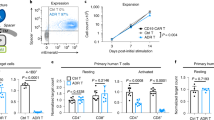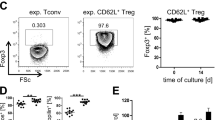Abstract
Retinol (vitamin A) and some of its derivatives have an important role in: (1) regulating growth, proliferation and differentiation of various tissues and (2) maintaining reproduction and visual function in man and higher animals1–5. Vitamin A and retinoids are also known as potent immunoregulatory6–14 and antineoplastic agents15,16. Their ability to increase reactivity to histoincompatible tissues is well documented7,8,17 but the mechanism of this action is unclear. Here we report that mice fed on an otherwise conventional diet supplemented with vitamin A acetate (VAA) respond to 105 semiallogeneic cells (a suboptimal dose) in a host-versus-graft (HvG) reaction, whereas mice on a conventional diet do not. It is possible to transfer this enhanced immune reactivity by injecting lymphoid cells from VAA-fed animals into those syngeneic mice maintained on the conventional diet. Using a positive selection technique, we demonstrate that the phenotype of the cell probably responsible for this phenomenon is Lyt 1+ 2−.
This is a preview of subscription content, access via your institution
Access options
Subscribe to this journal
Receive 51 print issues and online access
$199.00 per year
only $3.90 per issue
Buy this article
- Purchase on Springer Link
- Instant access to full article PDF
Prices may be subject to local taxes which are calculated during checkout
Similar content being viewed by others
References
Moore, T. in The Vitamins (eds Sebrell, W. H. & Harris, R. S.) 245–266 (Academic, New York, 1967).
Goodman, D. S. Fedn Proc. 38, 2501–2503 (1979).
Bollag, W. in Retinoids, Advances in Basic Research and Therapy (eds Orfanos, C. E. et al.) 5–11 (Springer, Berlin, 1981).
Sporn, M. B. in Retinoids, Advances in Basic Research and Therapy (eds Orfanos, C. E. et al.) 73–76 (Springer, Berlin, 1981)
Pawson, B. A. Ann. N. Y. Acad. Sci. 359, 1–8 (1981).
Dresser, D. W. Nature 217, 527–529 (1968).
Floersheim, G. L. & Bollag, W. Transplantation 15, 564–567 (1972).
Jurin, M. & Tannock, I. F. Immunology 23, 283–287 (1972).
Cohen, B. E. & Cohen, I. K. J. Immun. 111, 1376–1380 (1973).
Blalock, J. E. & Gifford, G. E. Proc. natn. Acad. Sci. U.S.A. 74, 5382–5386 (1977).
Dennert, G. & Lotan, R. J. Immun. 8, 23–29 (1978).
Dennert, G., Crowley, C., Kouba, J. & Lotan, R. J. natn. Cancer Inst. 62, 89–94 (1979).
Goldfarb, R. H. & Herberman, R. B. J. Immun. 126, 2129–2135 (1981).
Abb, J., Abb, H. & Deinhardt, F. Immunopharmacology 4, 303–310 (1982).
Sporn, M. B. & Newton, D. L. Fedn Proc. 38, 2528–2534 (1979).
Bollag, W. & Matter, A. Ann. N. Y. Acad. Sci. 359, 9–23 (1981).
Medawar, P. B. & Hunt, R. Immunology 42, 349–353 (1981).
Medawar, P. B., Hunt, R. & Mertin, J. Proc. R. Soc. Lond. B206, 265–280 (1979).
Malkovský, M., et al. J. Immun. 130, 785–790 (1983).
Loveland, B. E., Hogarth, P. M., Ceredig, Rh. & McKenzie, I. F. C. J. exp. Med. 153, 1044–1057 (1981).
Loveland, B. E. & McKenzie, I. F. C. Transplantation 33, 217–221 (1982).
Moon, R. C., Grubbs, C. J. & Sporn, M. B. Cancer Res. 36, 2626–2630 (1976).
Malkovský, M., Asherson, C. L., Stockinger, B. & Watkins, M. C. Nature 300, 652–655 (1982).
Hughes, W. L. et al. Fedn Proc. 23, 640–648 (1964).
Julius, M. H., Simpson, E. & Herzenberg, L. A. Eur. J. Immun. 3, 645–649 (1973).
Mage, M. G., McHugh, L. L. & Rothstein, T. L. J. Immun. Meth. 15, 47–56 (1977).
Mage, M. et al. Eur. J. Immun. 11, 228–235 (1981).
Zembala, M. A., Asherson, G. L., James, B. M. B., Stein, V. E. & Watkins, M. C. J. Immun. 129, 1823–1829 (1982).
Gorini, G., Medgyesi, G. A. & Doria, G. J. Immun. 103, 1132–1142 (1969).
Abehsira, O., Edwards, A. & Simpson, E. Eur. J. Immun. 11, 275–281 (1981).
Simon, M. M. et al. Eur. J. Immun. 11, 246–250 (1981).
Author information
Authors and Affiliations
Rights and permissions
About this article
Cite this article
Malkovský, M., Edwards, A., Hunt, R. et al. T-cell-mediated enhancement of host-versus-graft reactivity in mice fed a diet enriched in vitamin A acetate. Nature 302, 338–340 (1983). https://doi.org/10.1038/302338a0
Received:
Accepted:
Issue Date:
DOI: https://doi.org/10.1038/302338a0
This article is cited by
-
Vitamin A and tumor immunity
Experientia (1985)
-
Experimental analysis of the immunostimulating properties of vitamin A
Bulletin of Experimental Biology and Medicine (1985)
Comments
By submitting a comment you agree to abide by our Terms and Community Guidelines. If you find something abusive or that does not comply with our terms or guidelines please flag it as inappropriate.



